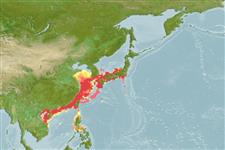分类 / Names
俗名 | 同种异名 | Catalog of Fishes(属, 种) | ITIS | CoL | WoRMS | Cloffa
Teleostei >
Eupercaria/misc (Various families in series Eupercaria)
鱸形目 (Various families in series Eupercaria) >
Sciaenidae (Drums or croakers)
石首魚科 (Drums or croakers)
Etymology: More on author: Richardson.
Environment: milieu / climate zone / depth range / distribution range
生态学
海洋; 半咸淡水 底中水层性; 海洋洄游的 (Ref. 51243); 深度上下限 0 - 120 m (Ref. 43239). 溫帶; 38°N - 13°N, 106°E - 141°E
Northwest Pacific: from central Vietnam to South Korea and Japan, Yellow and East China seas.
西北太平洋: 黃海與東中國海。
Length at first maturity / 大小 / 重量 / 年龄
Maturity: Lm ?, range 17 - ? cm
Max length : 80.0 cm TL 雄鱼/尚未辨别雌雄; (Ref. 4537); 最大体重: 243.60 g (Ref. 124479); 最大年龄: 6 年 (Ref. 104735)
背棘 (总数): 9 - 10; 背的软条 (总数): 30-35; 臀棘 2; 臀鳍软条: 7 - 9; 脊椎骨: 25 - 26. Body gold when fresh. Soft-rayed portions of dorsal and anal fins mostly covered with scales. Posterior part of pectoral fin not black. Anal soft rays usually 8 (Ref. 41299).
身体新鲜时金色的。 背鳍与臀鳍的有软鳍的部分大部份覆盖着鳞片了。 胸鳍的较后面的部分不是黑色的。 臀鳍软棘通常 8.(参考文献 41299)
Inhabit coastal waters and estuaries (Ref. 2113). Found in muddy or muddy-sandy bottoms shallower than 120 m depth (Ref. 43239). Feed on crustaceans and fishes.
栖息于沿岸水域与河口。 (参考文献 2113) 捕食甲壳动物和鱼类。
Life cycle and mating behavior
成熟度 | 繁殖 | 产卵场 | 卵 | 孕卵数 | 仔鱼
西北太平洋: 黃海與東中國海。
Masuda, H., K. Amaoka, C. Araga, T. Uyeno and T. Yoshino, 1984. The fishes of the Japanese Archipelago. Vol. 1. Tokai University Press, Tokyo, Japan. 437 p. (text). (Ref. 559)
人类利用
渔业: 高经济性; 养殖: 商业性; 水族馆: 商业性
更多信息
合作者照片Stamps, Coins Misc.声音神经毒速度泳型鳃区Otoliths脑重体重比眼睛色素
工具
特别资料
下载 XML
网络资源
Estimates based on models
Preferred temperature (Ref.
123201): 20.8 - 24.7, mean 22.8 °C (based on 54 cells).
Phylogenetic diversity index (Ref.
82804): PD
50 = 0.6250 [Uniqueness, from 0.5 = low to 2.0 = high].
Bayesian length-weight: a=0.00891 (0.00582 - 0.01365), b=3.07 (2.95 - 3.19), in cm total length, based on LWR estimates for this species & (Sub)family-body (Ref.
93245).
营养阶层 (Ref.
69278): 3.7 ±0.56 se; based on food items.
Generation time: 5.2 ( na - na) years. Estimated as median ln(3)/K based on 2
growth studies.
回复力 (Ref.
120179): 中等的, 族群倍增时间最少 1.4 - 4.4年 (Assuming tm=2-4).
Prior r = 0.30, 95% CL = 0.20 - 0.45, Based on 1 stock assessment.
Fishing Vulnerability (Ref.
59153): Moderate vulnerability (42 of 100).
Climate Vulnerability (Ref.
125649): Very high vulnerability (88 of 100).
Nutrients (Ref.
124155): Calcium = 20.5 [11.6, 37.2] mg/100g; Iron = 0.245 [0.121, 0.428] mg/100g; Protein = 18.9 [17.8, 20.1] %; Omega3 = 0.573 [0.296, 1.059] g/100g; Selenium = 16.5 [8.1, 31.9] μg/100g; VitaminA = 13.9 [4.5, 45.8] μg/100g; Zinc = 0.555 [0.398, 0.808] mg/100g (wet weight); based on
nutrient studies.
